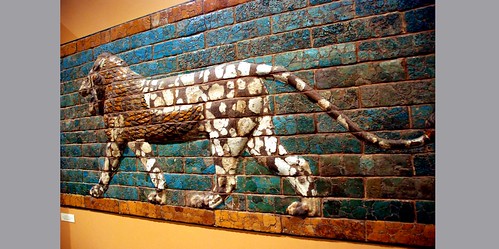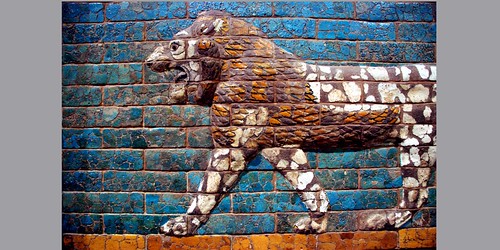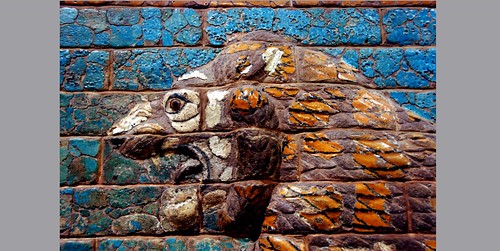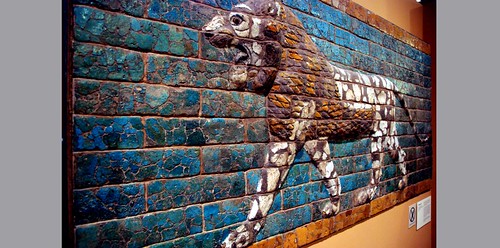Galería de Hans Ollermann
Oriental Institute, Chicago
2008_0923_180529AB The Oriental Institute, Chicago

Striding lion scene from Babylon (Tell Amran).in Iraq.
Reign of King Nebuchadnezzar II (605-562 B.C.),the kingdom of Neo-Babylonia's last important ruler. The city of his time became famous for the "hanging gardens".
The main road which followed the Euphrates, entered the city by the Ishtar Gate. The wall surface near the gate was decorated with the figures of bulls and dragons, representations of Adad and Marduk. The lions decorated the surface around the gate of his palace.
Oriental Institute, Chicago.
2008_0923_180540AB The Oriental Institute, Chicago

Striding lion scene from Babylon (Tell Amran).in Iraq.
Reign of King Nebuchadnezzar II (605-562 B.C.),the kingdom of Neo-Babylonia's last important ruler. The city of his time became famous for the "hanging gardens".
The main road which followed the Euphrates, entered the city by the Ishtar Gate. The wall surface near the gate was decorated with the figures of bulls and dragons, representations of Adad and Marduk. The lions decorated the surface around the gate of his palace.
Oriental Institute, Chicago.
2008_0923_180548AB The Oriental Institute, Chicago

Striding lion scene from Babylon (Tell Amran).in Iraq.
Reign of King Nebuchadnezzar II (605-562 B.C.),the kingdom of Neo-Babylonia's last important ruler. The city of his time became famous for the "hanging gardens".
The main road which followed the Euphrates, entered the city by the Ishtar Gate. The wall surface near the gate was decorated with the figures of bulls and dragons, representations of Adad and Marduk. The lions decorated the surface around the gate of his palace.
Oriental Institute, Chicago.
2008_0923_180553AB The Oriental Institute, Chicago

Striding lion scene from Babylon (Tell Amran).in Iraq.
Reign of King Nebuchadnezzar II (605-562 B.C.),the kingdom of Neo-Babylonia's last important ruler. The city of his time became famous for the "hanging gardens".
The main road which followed the Euphrates, entered the city by the Ishtar Gate. The wall surface near the gate was decorated with the figures of bulls and dragons, representations of Adad and Marduk. The lions decorated the surface around the gate of his palace.
Oriental Institute, Chicago.
2008_0923_180601AB The Oriental Institute, Chicago

Striding lion scene from Babylon (Tell Amran).in Iraq.
Reign of King Nebuchadnezzar II (605-562 B.C.),the kingdom of Neo-Babylonia's last important ruler. The city of his time became famous for the "hanging gardens".
The main road which followed the Euphrates, entered the city by the Ishtar Gate. The wall surface near the gate was decorated with the figures of bulls and dragons, representations of Adad and Marduk. The lions decorated the surface around the gate of his palace.
Oriental Institute, Chicago.
Comparto un video más de los trabajos de los arqueólogos españoles de la Universidad de Jaen está en español, Asuán es donde se desarrolla la novela que he escrito.
Saludos cordiales,
Mariela Taibo
Montevideo-Uruguay
Halladas cuatro ánforas romanas en la excavación de la partida de Mura en Llíria
Halladas cuatro ánforas romanas en la e...
Los Misterios Gnñosticos de Egipto
Trailer de Las Ruinas - www.dalealplay.c...
_________________________________________________________________
Recibe 80% menos correos no deseados en tu casilla de Hotmail. Conoce más.
http://www.descubrewindowslive.com/hotmail/anti-spam.asp
##########################################
RSS Feed de Amigos de la Egiptología
http://www.egiptologia.com/index.php?format=feed&TYPE=rss
##########################################
Noticias y Actualidad Egiptológica
http://www.egiptologia.com/noticias.html
Recomendamos: Sociedad Catalana de Egiptología
http://www.egiptologia.com/societat-catalana-de-egiptologia.html
--------------------------------------------------------------
LISTA DE DISTRIBUCIÓN DE AMIGOS DE LA EGIPTOLOGÍA - AE
Gestión Altas-Bajas y consulta mensajes enviados:
http://www.egiptologia.com/lista-de-distribucion.html
Moderador: Víctor Rivas egiptologia@egiptologia.com
Amigos de la Egiptología: http://www.egiptologia.com
Los mensajes de Amigos de la Egiptología son distribuidos gracias al apoyo y colaboración técnica de RedIRIS Red Académica Española - http://www.rediris.es

No hay comentarios:
Publicar un comentario